Melatonin For Sleep: How to Make and Protect Your Melatonin
Are you using melatonin for sleep? Why? You want to fall asleep, stay asleep, maintain deep and REM states, and wake rested. That’s all. You’re not asking for much. The issue is we all know how hard this can be. You may have issues in only one area but that’s pretty doubtful. When there is one sleeping issue, there are many typically. It’s a domino effect. Perhaps you fall asleep, stay asleep but don’t get much deep or REM sleep and absolutely don’t wake rested.
Taking melatonin for sleep does help some but not others. How can this be? As with most things in life, there are many factors at play. Let’s focus on an easy one which you can hit on right away by making some lifestyle changes.
How to Make Your Own Melatonin for Sleep
You have an internal factory which makes your own melatonin. The issue is that factory can easily be disrupted by:
- stress
- high protein diet
- inflammation
- infections
- heavy metals
- genetic polymorphisms (SNPs)
- low carb diet
- nutrient deficiency
- methylation dysfunction
- mouth breathing
- sleep apnea
That’s a pretty extensive list but I’ve left out a big one.
Light.
You have to turn off your lights and screens or your body won’t be triggered to make melatonin. A key initial stimulus for melatonin production is the onset of darkness. Without darkness, forget about it.
Key to Light Reduction to make your own Melatonin for Sleep:
- Turn off the lights
- Use low blue light bulbs
- Use blue light blocking glasses
- Blue light filter apps for your phone, computer, tablet
- Don’t watch TV or play video games within a couple hours of bed
Get your Blue Light Blocking Glasses
I bought these for my three boys. They look good, fit comfortably and work well. The issue is they are glasses. Easy to lose and break. They also come in handy when the Nerf guns are out.
Get your Low Blue Light Bulbs
Reading before bed is relaxing and enjoyable. The issue is the blue light. Book lights definitely are bright and do not filter the blue light. Thus, you are not making melatonin for sleep. The next closest thing to a book light is to use a reading lamp and replace the bulb with a low blue light emitting light bulb. This is what I’ve done in my bedroom. The light they emit is soft, functional and protects my melatonin. I turn these on when I start preparing for sleep – brushing my teeth, putting clothes away and reading. You can also install these low blue light bulbs in areas where you spend your evenings – not just a reading lamp. Perhaps you have a dedicated switch in your bathroom where you can install these as well.
Get Your F.lux App
This is a free app which you can download onto your computer, tablet, Kindle, iPAD or other electronic devices. Highly recommended. This is a screenshot of my f.lux app on my laptop which I am using now. Let’s face it. The evening is a good time to catch up on things and I often (cough) do some work in the evenings before bed – typically research or responding to comments as these are enjoyable for me. I do try to stay out of my inbox and Facebook. At times I will watch a video but I find that even with the f.lux app, my sleep is poor so I’ve cut this out tremendously – not completely – but close.
Use Your Phone’s Built in Blue Light Filter
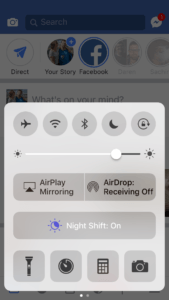
This is found when you slide your finger from the bottom of the screen towards the top. Swipe up. I typically keep this set to ‘Night Shift: On’ all day. Keep in mind that when you are taking photos or looking at them, it can make them look ‘odd’. So if you’re taking important photos, perhaps turn it off so you can see what you are taking. I hear that the F.lux app is actually better than the built in Night Shift mode on phones. I have not looked into it. Having this feature shown to your kids is important as we know how much they are on it. Not to mention the Airplane mode for sleeping – that is an absolute MUST.
We’re still not done. There is yet another one that is often not honored.
Circadian rhythm.
Your body is on a clock whether you like it or not. In fact, there are CLOCK genes which regulate key functions all day and all night keeping you functioning. If you are waking or going to bed at random hours, you will not be producing sufficient melatonin for sleep as your genes are confused. Naturally, the sun sets and rises at pretty consistent times with just mild adjustments – a few minutes variation. Now if you’re going to bed or waking a couple hours variation at a whack, than how can your genes know when to start making your melatonin for sleep? They will try but you’re confusing them.
Key: Get on a schedule so your melatonin-producing genes are on schedule.
My current schedule is not as structured as it could be. I typically am in bed by 10 pm and sleeping by 11 pm. I wake usually around 7 to 7:30 AM. I want to shift to 10 pm sleeping and 6 am waking. I’ll get there. Mentally it is tough for me – I woke up so early on the ranch my whole life and then rowing for UW. I have this ‘resistance’ to waking early which is dumb but we all have our own ‘baggage’ 😉
Some Common Sleep Questions
“Can I just take Melatonin for Sleep?”
This is often asked and yes I guess you could. However, I am a fan of letting your body make what it needs on its own. It knows better than we do. If your body cannot make melatonin because it lacks the nutrients to do so, by taking melatonin, you are not addressing the underlying problem. I’m always a fan of trying to identify the causes of issues and then removing them. Short term, say on flights or time zone changes, yes, taking melatonin can be useful – but a small amount.
Two things I want to add about melatonin:
- If you are trying to conceive a child, do not use melatonin as it may negatively impact your ovulation and thus your fertility.
- If you’re glucose levels are out of whack, melatonin can aggravate them further.
“When I sleep, I have super vivid dreams and wake exhausted.”
If this is you, you are doing well with getting REM sleep but you are not able to hit the Deep Sleep zone. This is much harder to do yet it is very important. One wants to get into deep sleep.
On average, adults spend this amount of time in various stages of sleep:
- Light Sleep: 50% total sleep time. I am average here – about 50%
- REM Sleep: 20% – 25% – decreases as we age. I do well here – averaging 30%+
- Deep Sleep 15% – 20% – decreases as we age. I personally am averaging only 10% currently. I need to work on this.
“How do you know how well you are sleeping?”
I track it. At first, I used Sleep Cycle app on airplane mode. My kids still use this and it works quite well. I wanted something more sophisticated and chose the OURA ring. NOTE: Save 10% on your OURA ring by using code aejjx87 (disclosure I do receive a tiny commission towards another OURA ring but I am more interested in you saving 10%. I’ve no need for another OURA ring.)
Here is my last night’s sleep – and yes, I was working on my computer with the F.lux app prior a bit:
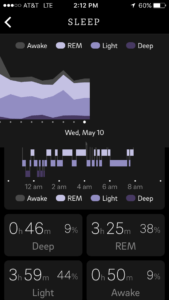
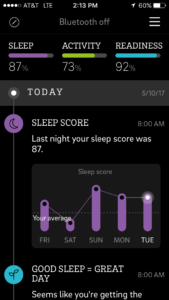
The very bottom of the graph – the dark purple – is deep sleep. Lighter purple is REM sleep. Even lighter purple is lighter sleep and the gray is awake time. As you can see, I slept horribly on Saturday. I don’t recall why. I am recovering from a 5 day conference where I presented for 25+ hours and also wrote an entire book in two months time 😉 Vacation on the horizon!
“I can’t fall asleep or stay asleep. What can I take?”
There are some evenings I am just wired – as are my boys. When this happens, having something to help induce a state of calm and sleepiness is welcomed. I still don’t turn to melatonin for sleep. Why? Because melatonin is not the only problem here. Commonly higher levels of stimulating neurotransmitters like dopamine, glutamate, histamine, norepinephrine and serotonin and higher thereby causing us to not be able to fall asleep easily.
How is your sleep?
Do you take melatonin for sleep? How does it work for you? What other tricks do you have to help you obtain a great night’s sleep? Share below.
References:
- Melatonin and blood glucose – https://www.ncbi.nlm.nih.gov/pmc/articles/PMC4173928/

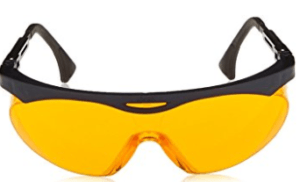
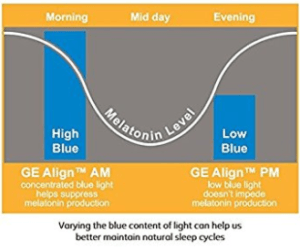
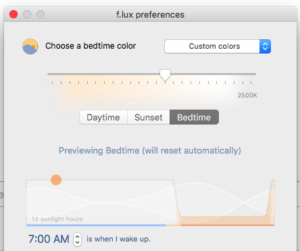
1 Comment
Not too long ago I read Melatonin could help with acid reflux so started taking 3 mg at night. Sleep patterns are unchanged – I fall asleep easily but wake every two hours. But it did wonders for acid reflux (nighttime GERD) and the post nasal drip that usually followed. This was after many dietary and lifestyle changes to alleviate reflux that didn’t work, so I’m happy that Melatonin does. But why, I wonder? I’ve read “Dirty Genes” and now that I found the website look forward to reading more material. Very interesting.